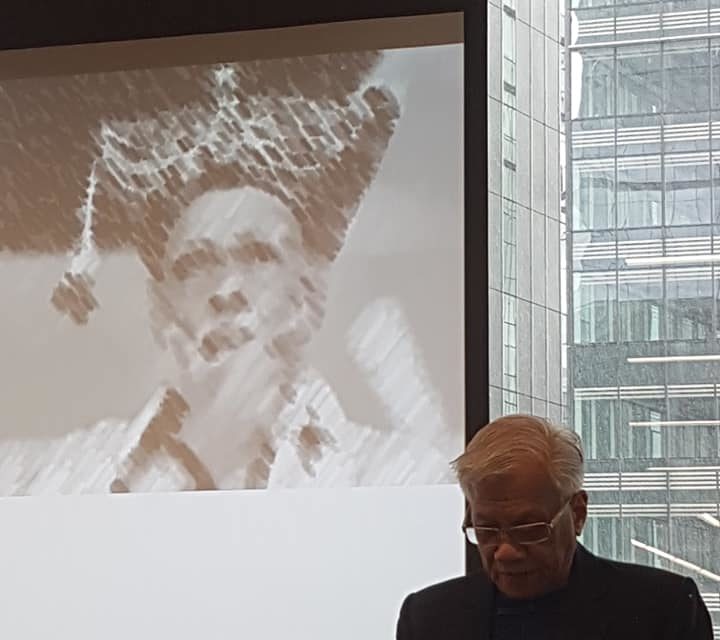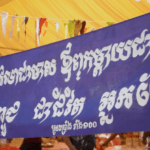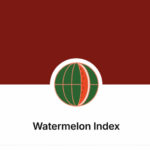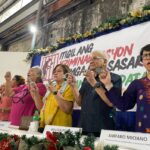Talk delivered to audiences in Canberra, Perth, and Melbourne during a book promotion tour, November 26-December 10, 2019.
By Walden Bello*
The title of my talk is “Democracy in the Era of Charismatic Politics in and India.” But what I would like to do, first of all, is to place this topic in the broader context that is the subject of my recently released book, Counterrevolution, which looks at the rise of the far right in a number of contemporary societies in the Global South.
While I Don’t Use the Term “Populist”
I prefer not to use the term populist to describe movements of the far right because populism does not offer any substantive light on the character, programs, and directions of these movements. Populism is a political style, one marked by a direct appeal to the people that seeks to mobilize them beyond the channels of institutionalized parliamentary politics. Thus there are populists of both the left and the right, and I fully agree with Australian National University Professor Paul Kenney who describes both Indira Gandhi and Narendra Modi, despite their radically different politics, as populists.
Counterrevolution and its Variations
Instead of populism, I have elected instead to describe these movements of the far right as “counterrevolutionary” because the term gives us a much better sense of what drives them.
In the book, I look at two types of counterrevolutionary movement. The first is the counterrevolution that is a response to a revolution, revolution being defined here broadly as an insurgent challenge from below to change the social and political regime. This challenge may not be revolutionary but reformist in its strategy but it is nevertheless seen as very threatening to the survival of the status quo. In the case studies I take up in the book, the processes that unfold in fascist Italy in 1920-22, Indonesia in 1965, Chile in 1970-73, and Thailand from 2001 to 2014, fall into this category of counterrevolution.
Using a revolution-counterrevolution paradigm, we can also appreciate the play of various actors. Here I borrow the great social and diplomatic historian Arno Mayer’s classification of the actors of what he calls the “anti-revolutionary triad:” the reactionaries who want to bring back the past, the conservatives who may not want to bring back the past but defend the status quo, and the counterrevolutionaries. The third type, the counterrevolutionaries, are the most interesting theoretically and dangerous politically, since they adopt both the mass mobilization style associated with the left and expropriate some of the left’s issues, at least rhetorically, in order to advance an anti-progressive agenda. Also, while they refer to the so-called glories of the past, the past they offer is an imagined ersatz past that is fabricated to cater to the values, interests, and prejudices of their mass base.
The second type of counterrevolution explored in the book is the one that is a reaction not to an insurgent challenge but to the failure of a paradigm of rule, a regime, to deliver on its promises on the part of groups that had initially put their faith in it. The current manifestations of this kind of counterrevolution are the movements against liberal democracy, both in the global South and the global North. These movements deserve the term counterrevolution because they seek to displace the current dominant liberal democratic regime with an authoritarian form of rule. The challenge they pose, moreover, is not only political but ideological, one that questions the basic values and processes of liberal democracy such as secularism, respect of diversity, equality, and due process.
The total challenge posed by this second type of counterrevolution is captured by the words of one very prominent right wing leader during the 20th century who said that the movement he belonged to sought to “erase 1789 from history.” While, unlike Joseph Goebbels, they may not have phrases that explicitly express their dislike and contempt for liberal democracy, the actions of Rodrigo Duterte of the Philippines and Narendra Modi of India, the two figures we will be discussing today, carry the same message.
Let me now move to my main topic, which is to analyze a recent development in two of the countries discussed in the book, the Philippines and India, that is both theoretically interesting and politically alarming. What I’d like to focus on is how and why democratic elections are, paradoxically, eroding what had been regarded as two of the most solidly liberal democratic systems in the global South: the Philippines and India.
Overall, the national elections held earlier this year in both countries were relatively free and fair, as even the opposition and international observers conceded, albeit grudgingly. Yet in both countries, the results are likely to provide momentum towards the concentration of power in the hands of authoritarian personalities.
Are the Masses Complicit in Duterte’s Crimes?
Let’s begin with the Philippines. President Rodrigo Duterte was not running for office, but everyone knew that the May 13, 2019, election was a referendum on his three years in office. If it were politics- as-usual in the Philippines, the president’s record could have done him and his favored candidates for the Senate much damage: the worst inflation in nearly a decade, kowtowing to China, credible charges of hidden wealth, a penchant for misogynistic comments, a provocative anti-clerical attitude in an overwhelmingly Catholic country, intimidating the press, imprisoning or ousting from office vocal opponents, and, perhaps, most seriously, over 20,000 deaths, a large number owing to extra-judicial executions, in his war on drugs.
But it is not politics-as-usual in the Philippines. At the time of the elections, Duterte had an astonishing 81 percent approval rating, and the results of the polls drove this home: his favored candidates and allies captured all 12 of the senatorial seats at stake. Not since the late 1980s had the opposition been completely shut out in a Senate race. As the results poured in on election night, May 13, it became clear that Duterte, warts and all, had been given an overwhelming mandate by the electorate, making him the most powerful person to occupy the presidency since Ferdinand Marcos.
Since electoral fraud wasn’t a credible explanation for the results, some political commentators elected to blame the voters. “We have most of the voters to blame for it,” wrote one prominent journalist critical of Duterte. “They’re the millions who approve of mass killings, who’re indifferent to the violations of human rights, who despise intelligence and who’ve never read a book. They disparage democracy without knowing what it is and approve of tyranny because they can’t tell the difference.”
If the writer were a conservative intellectual, I would not have given his comments a second thought. But he was a well-known man of the left who had previously written about the masses being the agents of history. His words reminded me of the thesis of Daniel Goldhagen’s controversial book Hitler’s Willing Executioners that ordinary Germans were complicit in Hitler’s crimes because they knew full well what was going on and they approved of it.
“A Moment of Dread for Indian Democracy”?
Bur let us move on to India. In contrast to Duterte, who had an amazingly high approval rating despite the existence of many serious problems faced by the Philippines, things did not seem as auspicious for Narendra Modi and the ruling Hindu nationalist BJP (Bharatiya Janata Party) at the beginning of the six-week long electoral process in India in April.
The annual growth rate was down to 5.8 per cent. The economic crisis triggered by “demonetization” — the sudden withdrawal from circulation of 500 and 1000 rupee notes, which represented 86 percent of the value of circulating currency — was not over. Farmers’ marches reminded the country of the crisis of agriculture, and violence spawned by an aggressive Hindu nationalism had become commonplace.
Yet after the votes were counted, the whole country was stupefied. The BJP had expanded its majority to 303 seats, 20 more than its 2014 tally.
Congress, the main opposition party that had been the dominant force in the first 30 years of India as an independent state was badly beaten, emerging with only 52 seats, with its leader Rahul Gandhi losing in his family’s traditional constituency, Amethi, in Uttar Pradesh. Modi came out much stronger from an election where he had been expected to emerge much weaker.
The desperate mood that engulfed those critical of Modi was captured by the words of one academic, who claimed that his victory was “a moment of dread for Indian democracy” because it had resulted in “the greatest concentration of power in modern Indian history.”
Suddenly, BJP boss Amit Shah’s boast that the BJP would rule India “for the next 50 years” no longer seemed incredible.
As in the Philippines, despairing liberals in India wondered what on earth made their compatriots “outsource their destiny” to a strongman, as one of them put it. Just as the Philippine intelligentsia expressed wonderment at how serious charges would simply bounce off Duterte, Indian liberals could not figure out what it was that made voters across the board readily absolve Modi for the very real problems being faced by the country, whether this was rising unemployment, farmers’ suicides owing to economic distress, numerous cases of lynching of Muslims accused of trading cattle, or the unsolved murders of prominent intellectuals.
Even his party’s endorsement of a known terrorist who had praised the assassin of Gandhi did not hurt Modi, leading one analyst to attribute his success to “smart political communication” that consistently projected him as being “above the fray.”
Controlling the narrative was certainly part of the explanation for Modi’s success, as it was for Duterte’s. Modi’s discourse placed him and the BJP as the agents of India’s economic development and the restoration of Hindu civilization’s ancient greatness. Duterte combined an earthy discourse that many saw as refreshingly free of the usual liberal democratic froth with a stern message of cleansing the country of the drug menace that was “destroying the youth of my country.”
This analysis, however, assumes the relationship between the voters and the strongman is a one-way street, whereas anyone who has lived through the tumultuous politics of both countries in the last few years would not have failed to note the very real synergy or mutually constructive relationship between the strongmen and their people.
For other analysts, Duterte and Modi had tangible achievements that overrode the problems pointed out by their opponents. In the case of Modi, for instance, voters were said to appreciate his campaign to build a toilet for every household, his free LNG connections for poor families, and a program of giving 6000 rupees a year to subsistence farmers.
These material benefits do not, however, add up to a viable explanation for the massive mandate. Politics in India and the Philippines today is not arithmetic, to use a famous Filipino politician’s inimitable description of democracy. Promising and providing goods and services is the stuff of patronage politics, of democratic politics-as-usual, but what is happening in both countries today is a political earthquake, a massive transformative change, a fundamental reconfiguration of politics.
The Era of Charismatic Politics
At the epicenter of this earthquake is a discontented citizenry, and it is as much an agent of change as the unorthodox personalities that have found a way to unlock its swirling passions.
The focus of citizens’ discontent is a system of liberal democracy that has simply not delivered on its promises. “India is a grotesquely unequal society,” writes Pankaj Mishra. “A great majority of Indians, forced to inhabit the vast gap between a glossy democratic ideal and a squalid undemocratic reality, have long stored up deep feelings of injury, weakness, inferiority, degradation, inadequacy, and envy; these stem from defeats or humiliation suffered at the hands of those of higher status than themselves in a rigid hierarchy.” This could be a description of 21st century Philippines as well, with the added dimension of disaffection for a state that has lost the capacity to perform what Thomas Hobbes saw as the raison d’etre of a state, that is protect the life and limb of its people.
It is the explosive synergy between a deeply disaffected citizenry and a political personality who has captured their imagination — and on whom they have rested their dreams and aspirations for the future — that today drives politics in both countries. It is perhaps easier to understand this dynamic in the case of Modi, who unites a dynamic personality to an aggressive ideology of wounded but assertive nationalism that has tapped into a country’s feelings of pride and shame, deep disappointment, and persistent hope.
Yet Duterte is, in his own way, a magnetic personality, one who strikes people as having what it takes not only to take out criminals but also to tame exploitative elites and discipline a people that famously regard themselves as rowdy and undisciplined. The very qualities that liberals despise in Duterte is what enables him to “connect” with the masses, especially with the volatile middle classes that feel most sharply the yawning gap between aspirations and the possibilities of fulfilling them in the “really existing” democratic dispensation.
A “Digression” on Duterte
In this connection, let me just say a few words about Duterte’s discourse, which is one of his great assets. I would like to point out three things.
First of all, from a progressive and liberal point of view, his discourse is politically incorrect, but that is its very strength. It comes across liberating to its middle class and lower class audience. Duterte is seen as telling it as it is, as deliberately mocking the dominant discourse of human rights, democratic rights, and social justice that has been ritually invoked but is increasingly regarded as a cynical coverup for the very real lack of human rights, democracy, and genuine equality in post-EDSA Philippines and its pervasive corruption.
Second, Duterte’s discourse involves a unique application of what Bourdieu calls the strategy of condescension. His coarse discourse, delivered conversationally and with frequent shifts from Tagalog to Bisaya to English, makes people identify with him, eliciting laughter with his portrayal of himself as someone who bumbles along like the rest the crowd or has the same illicit desires, at the same time that it also reminds the audience that he is someone different from and above them, as someone with power. This is especially evident when he pauses and utters his signature, “Papatayin kita,” or “I will kill you,” as in “If you destroy the youth of my country by giving them drugs, I will kill you.”
Third, Duterte’s speechmaking does not follow a conceptual or rhetorical logic, and this is another reason he can connect with the masses. The formal conceptual message written by speechwriters is deliberately overridden by a series of long digressions where he tells tales in which he is invariably at the center of things that he knows will hold the audience’s attention, even when they’ve heard it several times. Let me confess here that when I listen to Duterte’s digressions, peppered as they are with outrageous comments, like telling an audience he will pardon policemen that he will pardon policemen convicted of extra-judicial execution so they can go after the people who brought them to court, my mind has to restrain my body from joining the chorus of laughter at the sheer comic effrontery of his words. With Duterte, the digression is the message.
After that digression on Duterte, let me get back on track. The “connection” that has been forged between strong personalities and their people has ushered in a period that may best be described as one where charismatic politics has displaced democracy-as-usual. Here we might take a leaf from the great sociologist Max Weber, who saw “charismatic” authority or legitimacy as a dynamic transformative process that overwhelms both “traditional” and “rational-legal” authority and structures co-existing in society.
Charismatic politics exploits the contradiction between traditional authority structures that legitimize inequality and injustice and an idealized rational-legal order based on the principles of democracy, justice, and equality. Arundhati Roy captures this thrust of Modi’s project and her reaction to it when she writes, “In practice, India has been neither secular nor socialist. It has always functioned as an upper-caste Hindu state. But the conceit of secularism, hypocritical though it may be, is the only shard of coherence that makes India possible. That hypocrisy was the best thing we had…In his May 2019 victory speech, after his party won a second term, Modi boasted that no politicians had dared to use the word “secularism” in their campaigns. The tank on secularism, Modi said, was now empty. So it’s official. India is running on empty. And we are learning, too late, to cherish hypocrisy. Because with it comes a vestige, a pretense at least, of remembered decency.”
Charismatic politics is not politics as usual and is a fluid process that moves in uncharted waters until the charisma of the leader is “routinized” into a set of rules, procedures, and processes which become the new source of authority and legitimacy.
What I would like to emphasize though is that charisma is not simply an individual psychological trait but a social creation, a mutual construction. To quote Weber, “The holder of charisma seizes the task that is adequate for him and demands obedience and a following by virtue of his mission. His charismatic claim breaks down if his mission is not recognized by those to whom he feels he has been sent. If they recognize him, he is their master—so long as he knows how to maintain recognition through “proving” himself.” Moreover, charisma is effective only in a receptive social climate, where the resulting synergy is a political explosion. George Orwell underlined this historicity of charisma when he wrote that fascist leaders “only appear when the psychological need for them exists.”
Charismatic Politics and Othering
Charismatic legitimacy is hardly benign. Indeed, it almost invariably ends up with a dangerous concentration of power in the hands of the charismatic individual. And, equally alarming, its emergence has been accompanied by the imaginative creation of an “Other” or “Others” upon whom the ills, contradictions, and disharmony of society are projected. The achievement of social harmony is dependent on the excision or neutralization of the Other or Others — in the case of the Philippines, drug users, liberal politicians (“dilawan” or “yellows”), and communists; in the case of India, Muslims, Christians, westernized intellectuals, and Marxists. It does not take much for the leader and his disciples to set the mob on these “enemies of the people,” as persecuted communities in India would readily testify.
Here I would just like to point out that while he was Chief Minister of the state of Gujarat, there took place a notorious massacre of over 2,000 people, mainly Muslims, in 2002. The religious riot, many contended, was not so much spontaneous as planned, and Modi, they claimed, was at the center of it. The evidence for this was strong enough for the US State Department to ban Modi from entering the United States on the grounds of violating religious freedom until he was elected Prime Minister in 2014, at which point he was whitewashed into a US ally by no less than President Barack Obama himself—the same Obama, by the way, who criticized Duterte for human rights violations in 2016. But that is another story.
Charismatic Politics as Democratic and Authoritarian
A key feature of the dynamics of charismatic politics is that it is both authoritarian and intensely “democratic.” Allow me to deconstruct the democratic dialectic at the heart of the new authoritarianism.
One the one hand, followers are willing to hold their critical faculties in abeyance, ready to give the leader the benefit of the doubt even when they may not agree with everything that he or she stands for or promotes. And the more they give him the benefit of the doubt, the more they have an investment in him. As Duterte’s fiercest critic, the jailed Senator Leila de Lima put it, “That is the misconception we have about democracy. People feel invested in the person they supported, and they do not want to believe that he is capable of destroying an innocent human being because if they admit that, they believe that they also have to admit that they made the wrong choice. I think people aren’t yet prepared for that dose of reality.”
On the other hand, it is through the mediation of the electoral process, through direct contact with the masses during the campaign and through their act of willingly voting for him or his anointed ones, that the leader renews his or her legitimacy.
Managed elections like the one that took place in Thailand during the same period, which sought to institutionalize a military dictatorship, are fatal for charismatic authority. Indeed, the less controlled and more spontaneous the expression of approval, the greater the legitimacy that can be turned into even greater power. India and the Philippines have gone through relatively free elections that, by bestowing greater legitimacy on them, is, paradoxically, leading
to the concentration of even greater power in the hands of charismatic authoritarian personalities who are intent on doing away with the post-World War II liberal democratic dispensation and leading their consenting citizens to a Brave New World.
Let me qualify this, however. In their rise to and early years in power, leaders of the far right may use relatively free and fair elections to gain legitimacy, but with their authoritarian instincts, it is unlikely that they will allow them for long. When Amit Shah boasts that the BJP will be in power for the next 50 years, I do not think he is thinking of consolidating power only or mainly through elections.
One preview of how the BJP will transform India is provided by the prominent progressive academic Achin Vanaik: “The end goal here is not the establishment of a one-party dictatorship headed by a ‘Supremo’ but of a fundamentally undemocratic order that retains some democratic features. The majority Hindu population will certainly come to enjoy special individual and group rights denied to other religious minorities. The model is in many respects that of Israel, an anti-democratic because a Jewish state, which since it has certain democratic features including regular elections can, in the eyes of far too many, falsely pass itself off as a genuine democracy, albeit with some unfortunate undemocratic aspects.”
With Duterte, the arrangement will probably be a constitution that is largely left as it is but whose fundamental principles of due process and separation of powers are simply disregarded by executive fiat, most probably given a figleaf of legality through the invocation of a state of emergency, such as the state of martial law that has already been declared in a good third of the country.
Class and Charismatic Politics
Let me say that I am not saying that the politics of class is irrelevant to our understanding of the dynamics of politics in India and the Philippines. Neoliberal economic policies have been central in both creating discontent against liberal democracy as well as generating support for capitalism from the so-called new or aspiring middle classes that have benefited from neoliberalism that the insurgent authoritarian elites have capitalized on. But as with classical fascism, the relationship between capitalism and political counterrevolution is not simple and can best be understood if we theoretically grant the realm of politics significant autonomy from the economy and see factors such as personality, culture, and the people not as passive but as active agents in the radical right-wing restructuring of society that is taking place.
Let me give you one example of this very real relative autonomy of the political. The social and economic elites have congregated around Duterte not only because he is seen as supportive of their interests but also because they fear that the charismatic authority that he has can also be used to discipline them and dismantle their economic empires. Fear, as Congressman Joey Salceda, a Duterte ally, recently admitted in an interview, is the key reason the elites represented in the House of Representatives vote for Duterte’s legislative agenda. That is indeed the reason why some progressives and former progressives—some of them serving in his cabinet– back Duterte; despite his accommodation with the elites, they still hope that he will turn the power of the state against them, a hope (vain in my view) that continues to be nurtured by his high profile firing of some members of his cabinet accused of corruption.
Like Hitler, Mussolini, Orban, Trump, Le Pen, and other far right personalities, Duterte and Modi have arrived at some accommodation with the economic elites, but they are not the servants or the latter though they have not questioned the existing system of neoliberal capitalism under which the elites have flourished. Counterrevolutionaries have always had uneasy relations with economic elites, with both continually thinking of how one can harness the other to their respective projects.
No Retreat but…
I do not think we have time to compare the features of the far-right movements in the North with those in the South. Nor do we have time to tackle the very important task of discussing how we are to counter the new authoritarianism. Maybe we can discuss urgent questions more at length in the question and answer period. Let me just say, in this connection, that there must be no retreat from our aggressive defense of human rights, due process, and democratic rights that are under assault. But we cannot just be defensive. We must have an alternative to counter the seductive simplistic and dangerous visions of the far right.
In this regard, let me quote President Duterte’s fiercest critic, the unjustly jailed Senator Leila de Lima, to illustrate the conjuncture we face in places like India and the Philippines. She says that the old flawed liberal democracy has been consigned to history owing to its failure to live up to its promises but that the “the alternative to Dutertismo still has to be born,” and until then the people will continue to be entranced by Duterte as the people of Duterte’s city of Davao were when she tried unsuccessfully to get them to talk about the Davao death squad. It is important to fully understand and appreciate the dynamics of Dutertismo and Hindu nationalism and not reduce their hegemony to a simple question of people being manipulated or brainwashed or terrorized if we are to meet the urgent but complex challenge of coming up with a viable antidote to these dangerous people.
Thank you.
*Senior analyst and co-chairperson of the Board of Focus on the Global South, associate of Transnational Institute, and adjunct professor of sociology, State University of New York at Binghamton. He is the author of the recently published book Counterrevolution: The Global Rise of the Far Right (Nova Scotia: Fernwood, 2019).



![[Analysis] Deconstructing a dismaying outcome](https://focusweb.org/wp-content/uploads/2022/05/tl-deconstructing-a-dismaying-outcome-440x264.webp)





